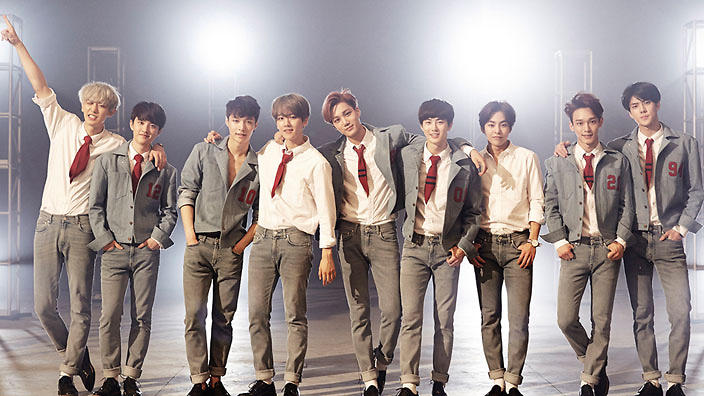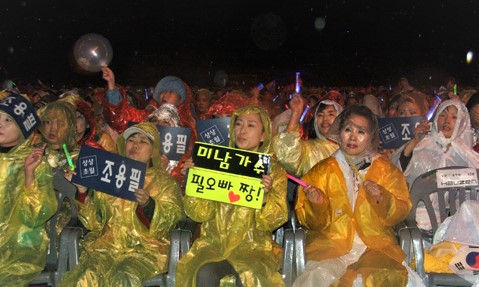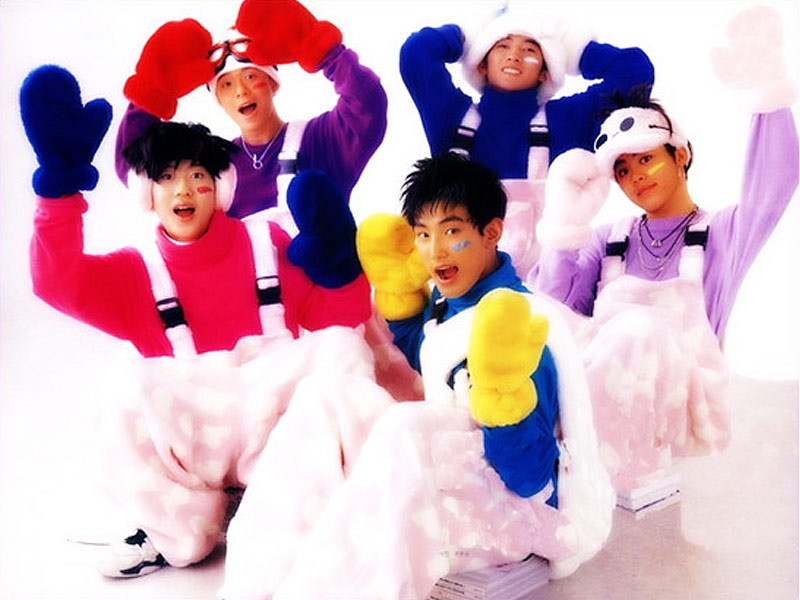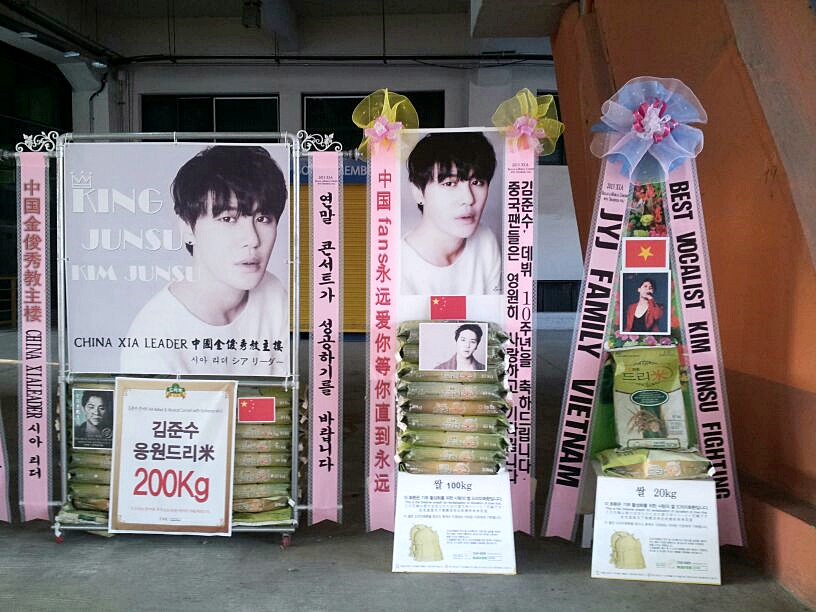Have you ever heard the terms “Club H.O.T”, “SHINHWA CHANGJO”, “Cassiopeia”, and “SONE”? These terms are the names of Korean idol groups’ fan clubs. Broadcasting, music, and movies have been recognized as important pop culture due to the media development nowadays. Furthermore, thanks to the remarkable marketing strategy, the popularity of Korean celebrities has grown rapidly and those who like them have earned the name, “fan”. Fans cheer for their own favorite celebrities and celebrities cannot exist without fans’ interest. Thus, fans form inseparable relations with their own celebrities. However, there are also fans who act improperly. They even act against celebrities in the excuse of expressing their affection. Therefore, there is an important question of whether one can call them true “fans”.
1What is“fan”?

According to Cambridge English Dictionary, a “fan” means someone who admires and supports a person, sport, sports team, and more. Fans engage in various activities in show of their affection toward celebrities. They often join fan clubs and buy goods related to their favorite celebrities such as albums and posters. In the past, the kinds of goods were limited. Fans only bought bookmarks, postcards, or calendars with pictures of their favorite celebrities. However, the goods are much diversified nowadays. For instance, S.M. Entertainment is selling ice trays engraved with EXO’s logo, beer with their artists’ characters drawn, and a light key ring where the face of EXO appears when the buyer presses the button. Goods are usually sold via online stores or concerts, but this entertainment also runs off-line shops. It is noteworthy that fans are also making goods directly these days. As a result, a new frontier in consumer spending has been taking shape and fans have played a key role in it. However, the influence of groups of fans is much bigger than individual fans.

2Changing aspects of celebrities and fans
“Fandom” is a coinage between “fanatic” and "dom". It means a group of fans who prefer a specific and an identical celebrity. In addition, it refers to a subculture composed of fans characterized by a feeling of empathy with others who share a common interest (Wikipedia). Since they love the same celebrity, communication and solidarity among fans are shared. In this process, communal values and cohesion are strengthened. Given this, fandom has continued to bind people together. As they also have a social and cultural impact, "fandom culture" has arisen. Fandom started by The Beatles’ fans in England in the 1960s. It became popular due to its differentiated music, and, in 1963, the term “Beatlemania” was coined. Since the fans gathered before the start of the concert The Beatles appeared, the concert hall turned into chaos. Thus, reporters tried to catch up with the situation and the “Daily Mirror”, a British daily, first used this term to describe the situation. As its popularity spread to America, Beatlemania also referred to American fans.

While there was Beatlemania in the United Kingdom and the United States, there was “Oppa group” in Korea in the 1980s. This word referred to a group of female fans for certain male celebrities. This word was used a lot thanks to the popularity of Jo Yong-pil, a Korean pop singer. A huge crowd of fans followed him, becoming the source for TV broadcast coverage. Then a few years later, Seo Tae-ji appeared and created a craze with his own unique music. Most of the fans acted passively at first such as watching the celebrities’ performance or writing letters, but they became more active and did more diverse activities. As a result, the “fandom culture” was systematically organized. Their cultural ripple effect was substantial and gradually expanded.
In the mid-1990s, the “idol groups” showed up and they caused many cultural changes. Especially, the advent of H.O.T changed the aspect of the music industry and behavior patterns of fans. Its fandom was called “Club H.O.T” and its members always held white balloons and wore white rain coats during H.O.T’s performances. These were their symbols, and after that, other fandoms came with their own balloons’ color to represent their clubs. They also had a huge influence on the commodities market. Many products based on the pictures of members of H.O.T were made such as stickers, books, dolls, and necklaces, and many fans bought them. From then on, “goods” became a by-product of the fandom culture. H.O.T’s popularity was quite significant, but it had a great rival, SECHSKIES. Its fandom was called “YELLOWKIES” and their symbolic color was yellow. The battle between their fans was also enormous. However, not only the two groups but also the other groups were famous at that time such as S.E.S, Fin.K.L, SHINHWA, and god. The public have called them the “first-generation idol groups”. At that time, however, the notion was prevalent that the idol group should adhere to a certain mystique. Thus, fans felt that members of the idol group were not like them and there were even rumors that they did not use the bathroom. There were few opportunities for fans to contact directly with their celebrities.

Tip Box
The 1990s was the golden age of college basketball. Among many universities’ basketball teams, teams of Korea University and Yonsei University were most popular. They fiercely competed with each other as rivals, and so did their fans. There was always a huge crowd of girls inside the stadium and their popularity was so great that fans gathered in front of their lodgings. The craze of the college basketball also affected the birth of the basketball drama, The Last Fight (1994) and the boom of the cartoon, SLAMDUNK.
Although the era of the first- generation idol groups ended because of dissolutions of H.O.T and SECHSKIES, new idol groups appeared and they started the “second-generation”. The representative examples are TVXQ, Super Junior, and BIGBANG. Their fans are called Cassiopeia, E.L.F, and V.I.P. They frequently appeared on entertainment programs as well as music programs, so it allowed fans to see their natural look. The change in the concept of abandoning the mystique and showing their natural look was successful. This prompted fans to feel closer to their celebrities for the first time, leading them to become more enthusiastic about their celebrities. Furthermore, with the exceptional advance in Internet and TV technology, foreigners could watch Korean broadcasting programs and listen to Korean music more easily. Thus, celebrities began to gain popularity not only in Korea but also abroad. As a result, “global fandom” was born. Thanks to the rapid increase in its scale, the idol groups topped several overseas music charts such as the Oricon chart. For instance, Super Junior ranked the first among other singers on the Taiwanese music chart for 100 weeks and this was an extraordinary record. In addition to that, they started to hold concerts abroad. TVXQ was the first Korean group who held a concert and successfully finished it at the Tokyo Dome. Moreover, after that, they held concerts there for four consecutive years. Tokyo Dome is a place where only the most popular singers hold their concerts and accommodates 50 thousand spectators, so the TVXQ’s successful performance has had a far-reaching impact. Later, many Korean singers were able to hold concerts at the Tokyo Dome due to TVXQ’s influence.
After ending the second-generation, more idol groups are making their debut and the number of them is fast increasing nowadays. E.X.O, BTS, and TWICE are now representative idol groups. They are working actively, being recognized around the world amid much love from their fans. Especially, celebrities that appeared before them were usually popular in Asian countries. However, the current celebrities are gaining a lot of popularity in countries in other continents such as France and Mexico. YouTube views are an objective indicator of their popularity abroad.
Moreover, not only idol groups but also actors’ fandoms are becoming widely established. For example, Song Joong-ki, a Korean actor, is loved by many people in other countries after acting in a drama, Descendants of the Sun (2016). This drama gained huge popularity from foreign fans, so there is even a special room in Doota duty-free shop near the Dongdaemun subway station for foreign fans who visit Korea. Photo zones which reenact sets for the drama are set up, so tourists can take pictures there. This shows how much the drama has gained popularity overseas. Even its economic effects exceeded one trillion won and British
Broadcasting Corporation (BBC) covered the drama in its news with the title “Descendant of the Sun: the Korean military romance sweeping Asia”. Encouraged by its popularity, Song Joong-ki also gained popularity abroad and many foreign fans. He successfully completed fan meeting in many Asian countries and it has always been sold out. As such, many actors have been able to have many foreign fans due to the success of the dramas they have acted in.
The Konkuk Bulletin interviewed two foreign exchange students at Konkuk University to see if Korean celebrities are actually recognized and popular abroad.
Interview
Nathalie / Sophomore / Business Administration Major / Germany
Q. Why did you become enthusiastic about Korean celebrities?
A. It is so different from our European music (or culture in general). Moreover, I love dancing and I think everyone knows that Korean music groups have amazing dancing skills. I often focus on the dance, instead of the lyrics.
Q. What is the difference between celebrities in your country and Korean celebrities?
A. Well, I think the main difference is that a lot of young people are already celebrities in Korea. In Germany, we have many celebrities who are in their twenties or older while in Korea I see a lot of idols who are just 17 or even younger when they start as a trainee. In addition, you cannot find someone doing "cute things" in Germany. They are all acting pretty serious or just in a slightly funny way.
Q. How popular are Korean celebrities in your country?
A. Not that much, but I think it is getting more and more popular. Sometimes you can find German fans commenting under K-pop YouTube videos. There are German fan clubs, but in comparison with other countries like America or Asian countries, not that much.
Q. Is there any way in order to see Korean celebrities?
A.We only had the KCON in France, our neighboring country, in 2016. I think B.A.P is coming to Germany this year. However, not that much, unfortunately. There are very few concerts.
Monica / Junior / Department of English Language & Literature / Bulgaria
Q. Why did you become enthusiastic about Korean celebrities?
A. Personally, for me, the way the groups were produced was very unique. The members were handsome or pretty and they were good at everything. More than anything, the way the idols interact with their fans and with each other was very interesting.
Q. What is the difference between celebrities in your country and Korean celebrities?
A. In my country, we do not really have idols. Most of our singers are solo artists. Even if there are groups, they do not live together or spend time as trainees. The way they interact with fans is also very different. In Korea, the fans play much bigger role in the idols’ lives. Our artists do not have fan clubs or fansites and are not followed during their daily lives by a bunch of fans with big cameras.
Q. How popular are Korean celebrities in your country?
A. The popularity of Korean celebrities in my country has been growing a lot over in the past few years. Korean music, dramas, movies, and shows are very accessible via the Internet and even if people do not understand Korean, they can see translations in English. For example, my grandmother was a big fan of the Korean drama, Boys Over Flowers (2009). Furthermore, the fact that a lot of groups have at least one member who speaks English is very important. In that way, international fans can communicate with the idols, too.
Q. Do you have any wish for Korean celebrities?
A. Nowadays, I do not really have much time to follow K-pop groups, but I have really liked K-hiphop since I came to Korea. It would be very nice if Korean music in general gets very popular around the world, not only K-pop. I often go to the hiphop concert because I feel quite attracted to the exciting atmosphere of singing along with other people. There are a lot of good music and talented artists. I think they can become very successful if they branch out outside of Korea.
As time passed, the aspect of celebrities and the relationship between celebrities and fans have changed a lot. The most notable characteristic of the change is the increase of opportunities for fans to communicate directly with celebrities such as fan signing events, live radio shows and SNS. Fans can receive autographs from celebrities directly at fan signing events, see their daily photos and chat with them. As the distance between them becomes closer, the one-way relationship turned interactive. As a result, fans get extremely excited about these things and they remain as members of the celebrities’ fandom.
Another characteristic is the development of the “support” and “re-support”. “Support” means that fans give a variety of presents to celebrities on the anniversary such as birthday. It was not problematic because they were satisfied with giving gifts to celebrities and seeing them using their gifts, but there were some occasions when gifts were too expensive to receive. Yet the amount of supports and the case that fans are available to give gifts to celebrities are limited following the influence of the Kim Young-ran Act that forbids receiving a gift exceeding a certain amount of money. However, celebrities do not only receive gifts from their fans and they also give gifts to their fans. “Re-support” is a term which indicates this. For instance, celebrities often give a lunch box or a cup of coffee to fans who attend a broadcast event. In the TV program, GOT7’s Hard Carry (2016), GOT7 made cupcakes by themselves and gave them to their fans. In addition, Suzy gave cosmetics and a T-shirt to her fans who attended her free fan meeting.
The last characteristic is an increase in the influence of fans. Since the most important issue for celebrities is their popularity, entertainment agencies tend to reflect the needs of the public who can be fans as much as possible. Thus, an idol group was created by viewers’ votes at the broadcast program, Produce 101 (2016). I.O.I, a Korean girl group formed through this program, has gained a lot of popularity and won the rookie of the year award. As such, the influence of the fans has become enormous.
3The deviant“fandom culture”
However, there are also people who are not in line with fandom that loves celebrities and cheers them in token of their affection. These people are commonly called “sasaeng fan”, which means an obsessive fan of celebrities that has engaged in stalking or other questionable behavior that constitutes an invasion of privacy (Wikipedia). The damage celebrities have suffered from them has been serious, and their brutality is getting worse over time. For instance, it is easy for them to find out a celebrities’ phone number and make incessant phone calls. Worse still, some sasaeng fans often take a taxi to chase celebrities around the clock and watch their every movement. Thus, Jackson, who is a member of GOT7 got injured in a car accident because of the sasaeng taxi which speedily chased the car he got into. As problems caused by the sasaeng taxi were so serious, a Korean broadcast program, We Want to Know (2008), dealt with this brutality. The pain that celebrities suffer is extremely serious, so some celebrities openly stated their pain recently. For example, Chanyeol, who is a member of EXO revealed his agony on Instagram. He wrote that more than 20 vehicles had followed him in Shanghai. He said their acts were excessive without showing respect to him. In addition, U-know Yunho, a member of TVXQ, mentioned openly in the Korean broadcast program that some sasaeng fans broke into his lodging. Then, they took pictures of the things in the lodging and sent them to him by text message. Many people who watched that broadcast were astonished and his fans were outraged. Furthermore, there are many celebrities who revealed their suffering because of the sasaeng fans who came to the front of their house. They said they are mentally ill and it is not “true love”. Due to the acts of brutality, the public’s view of the sasaeng fans is not good. Thus, The Konkuk Bulletin conducted a survey of 115 students of KU to know their view. According to the survey, 87.8 percent responded that “sasaeng fans” are not true “fans”. Respondents said that they are extremely selfish by violating celebrities' freedom and privacy. Some even described them as criminals and stalkers. Most people do not recognize them as fans, but they are still called sasaeng “fans”. Furthermore, laws are relatively well arranged to regulate stalking and punish stalkers in other countries such as the United States and Japan, but the legal measures to punish them are insufficient in Korea. Violations are punishable as a misdemeanor, but the penalty is less than 100,000 won and they are rarely punished because they are called “fans”. Thus, it is necessary to consider whether the term is proper. There should be more powerful and concrete laws to punish them.
Another deviant action is to ignore and criticize other fandoms. Everyone should respect others’ tastes, but some fans often exclude celebrities they do not like and other fandoms and criticize them by posting abusive comments or spreading rumors. Especially, due to the rumor that members of the Girls’ Generation tempted lots of male groups’ members, there was a conflict between the male groups’ fandoms and the Girls’ Generation’s fandom. As a result, most of the audience turned off their lightsabers and refused to cheer for Girls’ Generation for the 10 minutes they performed at the joint concert in 2008. Thus, they had to perform in the dark without any applause or cheers. Although the audience had attended a concert which they were supposed to enjoy together, they created a bigger conflict because of their immature actions, irritating the public. If fans do such a thing, not only fans but also celebrities are judged as having a bad image by the third parties. Fans’ actions can have a negative influence on their favorite celebrities.

Some of self-claimed fans have done distorted actions based on their own feelings, love, but it can be a crime. People who put themselves into celebrities’ shoes and respect them are the real “fans”. However, except for sasaeng fans, most fandoms are growing more mature because their activities affect their favorite celebrities’ images. Just a few years ago, it had been prevalent that fandom culture is immature and fans are blind followers of celebrities. Even nowadays, such view still remains afloat. In the survey mentioned previously, 12.2 percent responded that they think negatively about fans. They said that fans are only interested in their favorite celebrities and they are excessive. However, fandom culture is becoming more mature thanks to the advent of the “good culture”. Fans are donating many things to various charity organizations on special occasions such as celebrities’ birthdays. For instance, it is a trend to send Dreame, a rice wreath, to cheer for celebrities in many events instead of a flower wreath. The flower wreath is disposable, but there is a merit in that the rice used for Dreame can be donated to help people in need. Furthermore, fans often make a forest named after celebrities by supporting the creation of forests and trees. They created the forests not only in Korea but also abroad such as India, China, and the Republic of South Sudan. Eventually, fandom culture is neither immature nor the childish, and fans are developing an independent culture. This culture still has many possibilities to develop well and much value to be respected as a culture.


